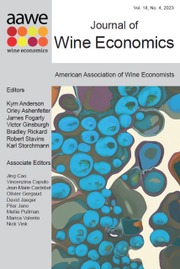Article contents
Disentangling Wine Judges’ Consensus, Idiosyncratic, and Random Expressions of Quality or Preference*
Published online by Cambridge University Press: 10 November 2017
Abstract
Judges confer various awards on wines entered in dozens of wine competitions each year. This article employs data on blind replicates to show that those awards are based on one instance of stochastic ratings assigned by wine judges; awards based on the expected values of those stochastic ratings would be different. This article recognizes the stochastic nature of ratings and builds on the work of many others to propose and test a conditional-probability model that yields maximum-likelihood estimates of judges’ latent consensus, idiosyncratic, and random assignments of scores to wines. The exact p-value for a likelihood test of the null hypothesis that the model's results are random is less than 0.001. Applying the notion of conditional probability may lead to better methods of assigning awards to entries in wine competitions and of assessing the capabilities of wine judges. (JEL Classifications: A10, C10, C00, C12, D12)
- Type
- Articles
- Information
- Copyright
- Copyright © American Association of Wine Economists 2017
Footnotes
The author thanks an anonymous reviewer for insightful and constructive comments. All remaining errors are the responsibility of the author alone.
References
- 5
- Cited by


